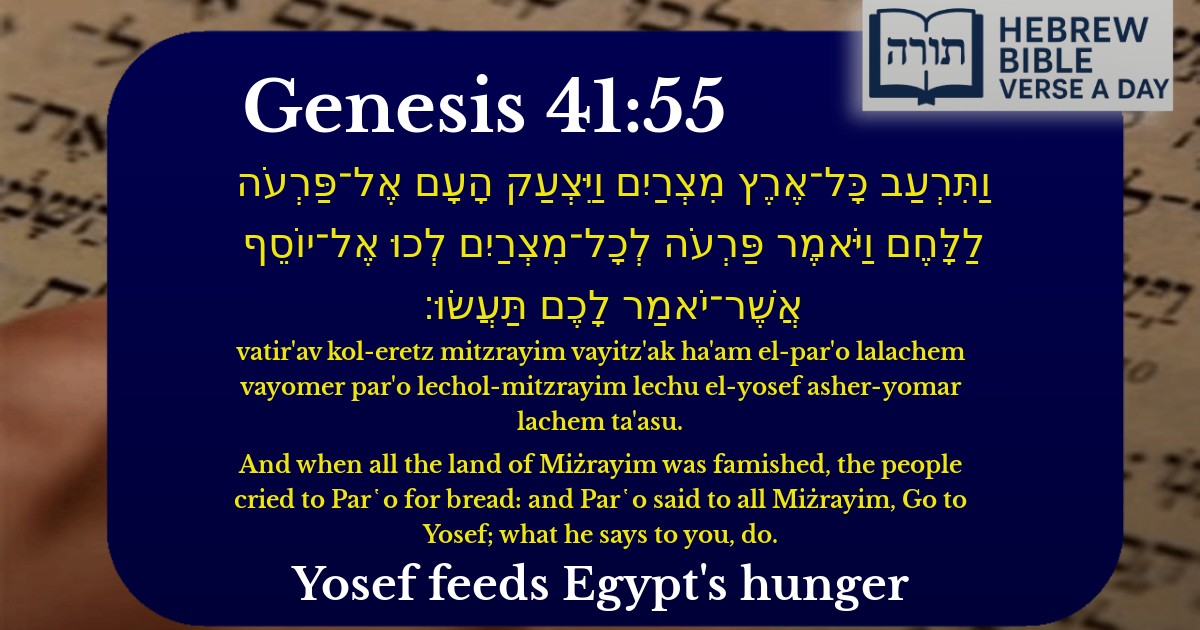Join Our Newsletter To Be Informed When New Videos Are Posted
Join the thousands of fellow Studends who rely on our videos to learn how to read the bible in Hebrew for free!
Hebrew Text
וַתִּרְעַב כָּל־אֶרֶץ מִצְרַיִם וַיִּצְעַק הָעָם אֶל־פַּרְעֹה לַלָּחֶם וַיֹּאמֶר פַּרְעֹה לְכָל־מִצְרַיִם לְכוּ אֶל־יוֹסֵף אֲשֶׁר־יֹאמַר לָכֶם תַּעֲשׂוּ׃
English Translation
And when all the land of Miżrayim was famished, the people cried to Par῾o for bread: and Par῾o said to all Miżrayim, Go to Yosef; what he says to you, do.
Transliteration
Vatir'av kol-eretz mitzrayim vayitz'ak ha'am el-par'o lalachem vayomer par'o lechol-mitzrayim lechu el-yosef asher-yomar lachem ta'asu.
Hebrew Leining Text
וַתִּרְעַב֙ כׇּל־אֶ֣רֶץ מִצְרַ֔יִם וַיִּצְעַ֥ק הָעָ֛ם אֶל־פַּרְעֹ֖ה לַלָּ֑חֶם וַיֹּ֨אמֶר פַּרְעֹ֤ה לְכׇל־מִצְרַ֙יִם֙ לְכ֣וּ אֶל־יוֹסֵ֔ף אֲשֶׁר־יֹאמַ֥ר לָכֶ֖ם תַּעֲשֽׂוּ׃
וַתִּרְעַב֙ כׇּל־אֶ֣רֶץ מִצְרַ֔יִם וַיִּצְעַ֥ק הָעָ֛ם אֶל־פַּרְעֹ֖ה לַלָּ֑חֶם וַיֹּ֨אמֶר פַּרְעֹ֤ה לְכׇל־מִצְרַ֙יִם֙ לְכ֣וּ אֶל־יוֹסֵ֔ף אֲשֶׁר־יֹאמַ֥ר לָכֶ֖ם תַּעֲשֽׂוּ׃
🎵 Listen to leining
Parasha Commentary
📚 Talmud Citations
This verse is not quoted in the Talmud.


Context of the Verse
The verse (Bereshit 41:55) describes the climax of the famine in Mitzrayim (Egypt) after Yosef (Joseph) had interpreted Pharaoh's dreams and was appointed viceroy to oversee grain storage. The people, desperate for food, turn to Pharaoh, who directs them to Yosef—demonstrating Yosef's divinely ordained leadership during this crisis.
Pharaoh's Recognition of Yosef's Authority
Rashi explains that Pharaoh's instruction, "Go to Yosef," reflects his complete delegation of authority to Yosef in matters of food distribution. This was a fulfillment of Yosef’s earlier interpretation (Bereshit 41:33-36), where he advised Pharaoh to appoint a wise man to manage the crisis. The Midrash (Bereshit Rabbah 91:5) adds that Pharaoh acknowledged Yosef’s wisdom and divine inspiration, hence his command to obey Yosef without question.
The People's Cry to Pharaoh
The Talmud (Chullin 60b) notes that the people initially turned to Pharaoh rather than Yosef because they still viewed Yosef as a foreigner and former slave. However, Pharaoh’s response reinforced Yosef’s legitimacy, teaching that true leadership is recognized by wisdom and divine providence, not merely by lineage or status.
Yosef as a Model of Divine Providence
Rambam (Hilchot Ta’anit 1:1-3) derives from this episode that times of crisis require centralized, divinely guided leadership. Yosef’s management of the famine exemplifies how a righteous leader, guided by Hashem’s wisdom, can save a nation. The Sforno adds that Yosef’s policies—selling grain rather than distributing it freely—prevented hoarding and ensured equitable access, reflecting his practical and moral insight.
Lessons in Emunah (Faith) and Hishtadlut (Effort)